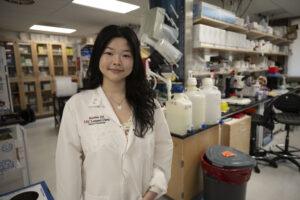WFTV includes insights from Valter Longo on how AI could personalize prevention and care by analyzing vast biomarker data. “Soon enough, AI could look at 20,000 biomarkers and, based on millions of cases, recommend personalized interventions… It could recommend healthy actions based on biological age, hormones, and other factors.”
Hospice News features a new study co-authored by Susan Enguídanos detailing social workers’ roles and challenges in preparing patients and caregivers for hospice-initiated live discharges and underscoring the need for standardized, reimbursable discharge processes.
Knowridge Science Report featured a study by Max Thorwald and Caleb Finch on iron’s role in Down syndrome-associated Alzheimer’s disease.
Earth.com featured a study by Mateo Farina, Jung Ki Kim and Eileen Crimmins on how differences in biological aging based on education level have widened over the past 30 years. “Education shapes opportunities and risks throughout life,” Crimmins explained. “It’s a powerful social determinant of health, and it is leaving a mark on how fast or slow our bodies age.”
Scienmag reports on a USC-led randomized trial co-led by Mireille Jacobson, showing that modest guaranteed gift cards increased enrollment among low-income older adults into an Alzheimer’s research registry, potentially speeding diverse participation in studies.
Yahoo (via Telegraph) quoted Jennifer Ailshire in an article about how Baby Boomers may be the wildest generation. “I have often said that baby boomers are going to fundamentally reshape what ageing looks like… We had the stereotype of a grandma knitting or an old fellow gardening because we have associated ageing with frailty and ill-health and a lack of ability to be out in social spaces. Boomers are the first generation in the history of the world to have really benefited from new medical interventions and advice on how to stay fitter for longer, and as a result a great number feel younger and seem younger than those who came before them.”
Arizona Daily Star republished a story by KABC-TV, which had interviewed Jennifer Ailshire about a study showing extreme heat may accelerate biological aging in adults aged 56 and older.
Bristol Post cited research by Valter Longo in a story about various ways to stay healthy and improve long-term health.
Irish Times quoted Lon Schneider of Keck School of Medicine and USC Leonard Davis School discussing a recent study that found combining exercise, a healthy diet, brain games, and socializing can significantly improve cognitive performance in older adults at risk for dementia, with even modest interventions showing benefits.
National Geographic featured a study by Eun Young Choi and Jennifer Ailshire on how experiencing more days of extreme heat correlates with faster biological aging.






